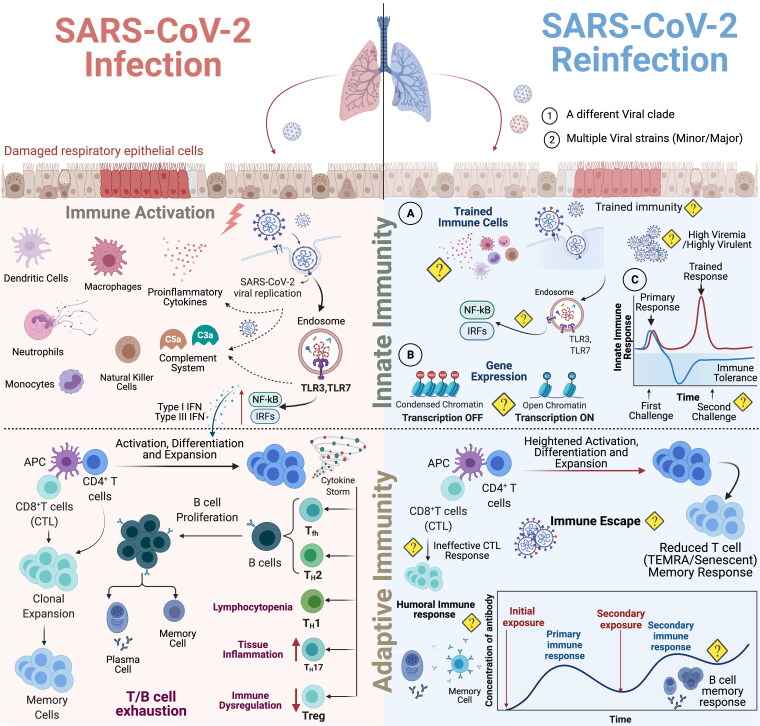Figure 4.
Comparative immunological response (Innate vs adaptive) in SARS-CoV-2 infection and reinfection. SARS-CoV-2 attach to ACE2 receptor highly expressed by the respiratory epithelium that eventually results in epithelial cell damage as the virus replicates and these damaged cells in turn activates different part of the immune system. Following activation, immune cells differentiate into dendritic cells and macrophages. SARS-CoV-2 antigens acts on endosomal TLR3 and TLR7 which then turns on NF-κB signaling cascade in monocytes, plasmacytoid dendritic cells (DCs), and macrophages to produce Type 1 interferon for activation, differentiation and expansion of CD4+ T cells. There is also production of pro-inflammatory cytokines such as IL-6 and activation of complement cascade with release of C3a and C5a. Neutrophils via extracellular traps and reactive oxygen species cause mucositis, capillaritis, thrombosis and capillary leak syndrome. Antigen presenting cells carrying viral antigen interact with T cells and activate adaptive immunity. CD8 + T cells perform cytotoxic function while CD4+ T cells differentiate into Tfh, Th2, Th1, Th17 and Tregs. Tfh and Th2 facilitates B cell proliferation which further differentiate into antibodies producing plasma cells. CD4+/CD8+ T and B cells undergo extensive exhaustion leading to lymphocytopenia during an active SARS-CoV-2 infection, however, few cells still undergo clonal expansion to form memory cell pool [63]. During SARS-CoV-2 reinfection thathappens possibility by different viral clade or a virulent strain, the innate immune cells might have trained immunity to limit viral replication. However, there are many unanswered immunological questions during SARS-CoV-2 reinfection [1] Is there an induction of trained immunity during SARS-CoV-2 reinfection? If yes, then how would the trained immune cells behave during high viremia and in the presence of highly virulent SARS-CoV-2 strain? [63] How is the NF-κB signaling cascade and production of type 1 interferons regulated during the second encounter? [3] What are the epigenetic changes and how they impact the immune response during reinfection? [4] What component determines disease severity: immune tolerance or trained immunity? SARS-CoV-2 reinfection might result in heightened activation, differentiation and expansion of the T and B cell memory pool triggering adaptive immune response. The magnitude and breadth of the secondary humoral immune response necessary to contain SARS-CoV-2 reinfection needs further investigation.

